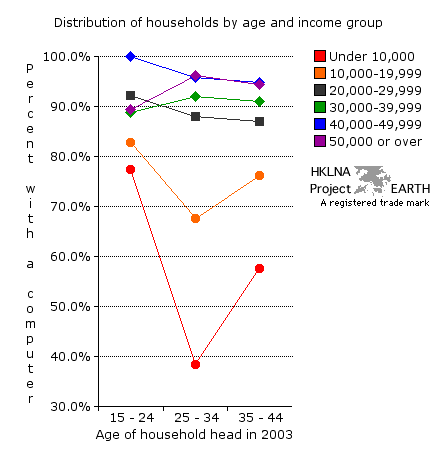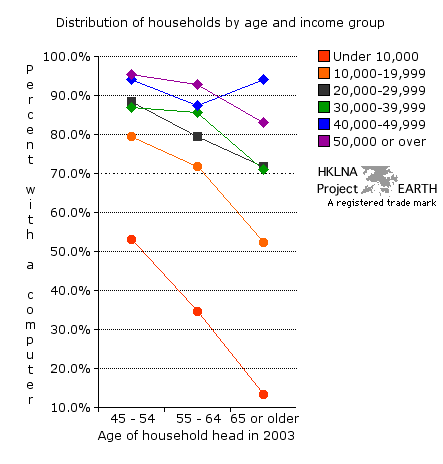Hong Kong's Information Society
The structure, flow, use, and language of information in Hong Kong society
Household computers and internet access in Hong Kong
Closing the household computer and internet access gaps in 2003
| Graph 93a - Percent of all households
with a computer by age of household head and income group (Ages 15 to
44). graphs 87a, 87b, and 87c | graphs 88a and 88b | graphs 89a and 89b | graphs 90a, 90b, and 90c | graphs 91a and 91b | graphs 92a and 92b | graph 93b | graphs 94a, 94b, 94c, and 94d | data collection (graphs) |
 |
| Note 1:
Each data point represents the fraction of households of a particular
household age and income group at the time the survey was taken. Age
refers to the age of the household head, not the average age of its
members. Income is measured in Hong Kong dollars per month. |
| Note 2: This graph can be
read by comparing the relative position of each age group by its level
of income (a vertical reading of differently colored dots) or by
comparing the relative position of each income group according to the
age of its household head (a horizontal reading of dots of the same
color). |
| Note 3: Reading across the under
HK$10,000 and between HK$10,000 and HK$19,999 income groups shows
a marked decline in each for the age group 25-34. This can be explained
by what likely occurs when a child leaves home to start his own
househld. Very young households (age 15-24) are probably students
living at a college or university, or self-employed, single, young
adults who are well-supported by their parents. This group
differs significantly from their older counterparts (age 25-34), who
are likely married and have started a family of their own. Only
after several years do the children of these older households beome of
age, and the need for, and the ability of their parents to afford, a
computer becomes possible. In many cases computer ownership is never
realized. In contrast, about 90% of all households income
brackets HK20,000 or above host a computer no matter the age of
the household head. |
| Note 4: "Personal computers refers to a computer designed for individual use. Personal computers includes desktop computer, laptop/notebook computer and Personal Digital Assistant. Servers, workstations and terminals of mainframe or minicomputer are not included. Personal computers may be connected to form a Local Area Network (LAN) or Wide Area Network (WAN)." Source: Hong Kong Government. Census and Statistics Department. Information Technology and Telecommunications Statistics Section. 2003. Hong Kong as an Information Society. Appendix A - Terms and Definitions 1.3, p. 115. Comment: An email from the Social Survey Section of CSD confirmed that both sections used the same definition for the term personal computer in their respective reports. |
| Source: Hong Kong Government. Census and Statistics Department. Social Surveys Section. 2003. Thematic Household Survey. Information Technology Usage and Penetration. Data obtained by special request from the Social Surveys Section. EARTH's copy of the corresponding table is available on request. |
| Graph 93b - Percent of all
households with a computer by age of household head and income group
(Age 45 and older). graphs 87a, 87b, and 87c | graphs 88a and 88b | graphs 89a and 89b | graphs 90a, 90b, and 90c | graphs 91a and 91b | graphs 92a and 92b | graph 93a | graphs 94a, 94b, 94c, and 94d | data collection (graphs) |
 |
| Note 1: Each data point represents the fraction of households of a particular household age and income group at the time the survey was taken. Age refers to the age of the household head, not the average age of its members. Income is measured in Hong Kong dollars per month. |
| Note 2: This graph can be read by comparing the relative position of each age group by its level of income (a vertical reading of differently colored dots) or by comparing the relative position of each income group according to the age of its household head (a horizontal reading of dots of the same color). |
| Note 3: After age 54 there is a
general decline in the number of households with a computer. This
probably has more to do with the age of the technology than the age of
household heads. The apparent rise for the HK$40,000 to HK$49,999
income group is probably due to sampling error. In any case, the
households of the two lowest income groups are clearly disadvantage at
all ages. |
| Note 4: "Personal computers refers to a computer designed for individual use. Personal computers includes desktop computer, laptop/notebook computer and Personal Digital Assistant. Servers, workstations and terminals of mainframe or minicomputer are not included. Personal computers may be connected to form a Local Area Network (LAN) or Wide Area Network (WAN)." Source: Hong Kong Government. Census and Statistics Department. Information Technology and Telecommunications Statistics Section. 2003. Hong Kong as an Information Society. Appendix A - Terms and Definitions 1.3, p. 115. Comment: An email from the Social Survey Section of CSD confirmed that both sections used the same definition for the term personal computer in their respective reports. |
| Source: Hong Kong Government. Census and Statistics Department. Social Surveys Section. 2003. Thematic Household Survey. Information Technology Usage and Penetration. Data obtained by special request from the Social Surveys Section. EARTH's copy of the corresponding table is available on request. |
| top |